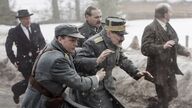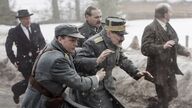Because some military fan classmates came to Oslo to play, accidentally hit the Oscar Borg Fortress, and learned about this Oscar-winning "The King's Choice".
_________________________________________________________________________________
The general background of this period of history is that in December 1939, after believing that the Allied forces might threaten the source of the German iron ore, Hitler ordered the Wehrmacht Supreme Command to prepare to invade the then neutral Norway.
In January 1940, the German Navy decided to attack Norway. The German army plans to occupy the capital Oslo, Bergen, Stavanger and other major cities at the same time, and capture the Norwegian king and important officials, in order to reduce Norwegian resistance and British intervention, and quickly end the fighting. This plan, together with the plan for fighting Denmark, is called Operation Weser.
In April 1940, the operation was launched. On the 8th, Germany’s latest General Hipper-class cruiser at the time, the Blücher, led the armored ship Lützov, the light cruiser Emden, 3 torpedo boats, and 8 mine-sweeping boats to the Oslo Fjord.
But the invasion did not go as smoothly as expected. A British submarine HMS Triton spotted the Germans and fired several torpedoes on the fleet. Although it didn't hit the target, the suddenness of the action was greatly reduced-at least now the Norwegian already knew that someone was coming.
But the incident happened suddenly, and the Norwegian government and the king did not know German intentions. At this moment, the Oscarsborg Fortress guarding the throat leading to Oslo has only 450 new recruits, all of whom have no actual combat experience. According to the original plan, some of them are still planning to deploy mines. All the heavy weapons of the Norwegian garrison, the three 280mm Krupp cannons in front of the fortress, have been used for more than 40 years.
At 23:00 on the 8th, the invading fleet arrived in the Oslo Fjord. The Norwegian defenders discovered the fleet and switched on the light control at 0:00 on the 9th. But the Germans did not regard the weak Norwegian defenders in their eyes. The Blücher decided to break into the fjord with a single ship in order to achieve the original goal of reaching Oslo before dawn.
At 4:10, the searchlights of the Norwegian defenders spotted Blücher. At 4:21, the 64-year-old Norwegian veteran who was sitting in the Oscar Borg Fortress, Colonel Bilger Eriksson, issued an order to fire on an unknown warship. Eriksson had not received a clear order from his superiors, nor had he received any information about whether the incoming ship was subordinate to the Allied or German forces, but he clearly knew that Norway is now a neutral country. After issuing the order, facing the questions of his subordinates, Eriksson uttered his most famous answer: "Whether I will serve or be sent to a military court, I will be fired! (Either I will be decorated or I will be court martialled, Fire!)".
The loading speed of the old shore artillery was too slow, and the fortress had insufficient manpower. Under the short shooting window, the Norwegian defenders could only fire two shells. Although all recruits were operating, both shells steadily hit the Blücher. The first shell penetrated Blücher’s side armor and happened to explode in the ammunition depot, which was filled with fuel, smoke generators, incendiary bombs, aerial bombs and depth charges-one of Blücher’s The watertight partition was completely blasted, and a raging fire ignited. The second shell destroyed the power supply system of Blücher's main gun, causing Blücher to fail to fire back with the main gun in the end.
At the same time, the small artillery of the Norwegian Coast Guard damaged Blücher's steering gear and forced the cruiser to slow down; when he slowly slipped out of the fortress's firepower range, he came within the torpedo range of the fortress Anji torpedo.
The torpedo used in Norway is a white-headed torpedo made by the Austro-Hungarian Empire 40 years ago. Although these torpedoes have been successfully tested hundreds of times, whether these old antiques are effective today is another matter. With the idea of fighting, Colonel Anderson on the launch podium pressed the launch button. At about 4:30, the two torpedoes shot out beautifully one after another, and ran straight towards the cruiser through the 3-meter-deep underwater channel.
The torpedo just hit the middle of the ship—the ammunition depot hit by the first 28cm shell. This caused another big explosion. At 6:23, the Blücher capsized and sank, killing 830 of the 2,202 crew and combat personnel on board.
Relying on 450 recruits and two calm commanders, the Norwegians sank the latest German cruiser that had just been in service for six months with equipment 40 years ago.
_________________________________________________________________________________
The battle at Oscar Borg Fortress is only a few minutes in the movie, but it is of vital importance to Norway. Since the Germans did not know that there were shore-based torpedo launchers in the fjord, when Blücher caused an underwater explosion, the captain of the Lützov believed that the Norwegians had deployed mines in the fjord and it was not appropriate to attack from waterways at this time. , So ordered the subsequent fleet to turn around and retreat, instead attacking Oslo by land.
However, it takes one and a half days to reach Oslo by road. This delay not only allowed the Norwegian royal family and Parliament to transfer together, but the central bank also took away the national treasures and gold from the treasury.
On April 9th Norway officially declared war on Germany.
On April 11, Germany and Norway officially entered a state of war.
The king’s choice tells the story from April 8th to April 11th, 1940.
Norway’s deep-water port, wide access to the sea not blocked by the British, and rich oil and mineral resources make it difficult for him to be coveted by powerful enemies in war.
The king in this movie is an ordinary person, a kind old man, who cherishes his family like all ordinary people in Norway. He didn't expect Germany to attack, and he still finished hide-and-seek with his children. In the early hours of the morning, he tried to call his brother, the King of Denmark. Even if he evacuated in a panic, he spent time with his grandson. He was also scared when avoiding air raids, but subconsciously he would protect strange children.
He is not a person full of personal charm, but he knows his responsibilities and the limits of his rights.
When he left Oslo, everything was unknown. He chose to believe in the government and the monarchy did not interfere with the administration.
When there is a discrepancy with the government's position, he chooses to support the government, and the monarchy does not interfere with the administration. The prince was a bit young and vigorous, and he also severely reprimanded him.
When the government wanted to arrange for him to meet with German military officials, it was tantamount to a banquet. But he only said that as long as it is for Norway, I can go.
But he is not weak and has no opinion. The government wants to surrender, and he supports it. This is because the country is run by a democratically elected government. He respects the country’s system and the people’s choices. He believes that the government’s choices are also for Norway. But he, personally, could not accept that the country was invaded by Nazi Germany, and he could not accept his appointment of Quisling, a notorious man as prime minister. This goes against his duty as a king, and he would rather abdicate.
Whether to abdicate or not is part of his rights and obligations as a king. Interfering with the government is not part of his rights. Regardless of his will, regardless of whether the period is extraordinary or not, he is not above others, above the state system.
He was selected by the Norwegian people from Denmark and brought his wife and children to a strange land to perform his duties. If the years are quiet, he is also an old man who enjoys his family.
However, when the country was invaded, he would rather choose to go around, be separated from the flesh and hide in Tibet than to make it. He thought it was not the choice that the Norwegian people wanted.
"Do you know that in the entire Norwegian history, I was the first king elected by the people? Norway is a democratic country. People have the right to choose, and the people have the right to listen and respect. If I give you an answer now, I Will ignore all this."
The moment when the king scolded the German diplomat was the highlight of the whole movie. Although the king occasionally expressed his opinion before, most of the time he looked like an old gentleman and was pushed away. When he scolded the diplomat angrily, you only realized that the king saw it clearly.
"Who do you think you are? You are just an ambassador! You think you are a peace dove, you are just a representative of a warmonger! The peace dove will not ask our country to surrender. With this arrangement, Hitler wants to benefit!"
When he said this passage, his anger and fluency made his previous gentleness and unbearable, including the calm and slow speaking rate when he started talking with the ambassador, became particularly heavy.
Then, when he faced government officials, the people, and the country he loved, he read his attitude and his choice, I felt that he was about to cry. Not a fragile, but an introverted king who spoke out his deep love for the country. Knowing what you can't do, do it for Norway. In this section, I have to say that Jesper played very well.
This is a small country, and everyone is a very ordinary person.
But even if it is a small country, it has its own dignity to survive in the cracks.
Follow-up/PS:
After Norway and Germany entered a state of war, 55,000 Norwegian soldiers resisted one hundred thousand German troops for 67 days. One thousand three hundred people were sacrificed and one thousand seven hundred Germans were killed. Norway is the second longest supported country among the countries invaded by Germany in World War II, and the first is the Soviet Union.
Later, France fell. On June 7, the King and Parliament transferred to Britain to form a government in exile. On June 10, Norway fell. Prince Olaf once asked to stay in Norway and lead the guerrillas to attack German troops on the snowy field, but the government refused.
Since Norway never surrendered to Germany, the Quisling government was not granted legal status. Therefore, Norway is not a conquered country. After the government went into exile, Norway was still able to continue participating in the war as an allied force.
PPS: Norway’s neighbor, Denmark, was quickly occupied by German forces in two hours. Under the threat of bombers roaring across the sky and threatening to bomb Copenhagen civilians, the older brother of the King of Norway, the elderly King Christian, chose to surrender. As a cooperation, Denmark asked Germany not to persecute its own Jews and execute the death penalty. The army cannot be annexed by the German Wehrmacht. The government, parliament, police and justice are also in the hands of the Danes.
The surrender of the Danish King delayed the arrest and deportation of Danish Jews by Nazi Germany, and almost all of them were evacuated to Sweden. Of the approximately 8,000 Danish Jews estimated before the war, fewer than 500 were deported and fewer than 50 died.
Most things in the world are difficult to choose. The pros and cons are unpredictable. Therefore, people's heart and pattern are in the details of choice.
The king's choice is not just whether or not to surrender to Germany. What they did was actually a series of choices.
The choices of the two kings all shining with the brilliance of humanity.
The historical data in the dividing line is referenced from
Wikipedia: Operation Weser Exercise
The End of the Fjord: Battle of the Drébac Strait
View more about The King's Choice reviews











